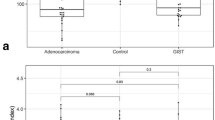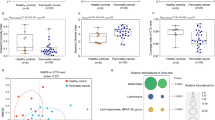Abstract
Background
Many diseases have been associated with intestinal microbial dysbiosis. Host–microbial interactions regulate immune function, which influences the development of gastric cancer.
Aims
The aims were to investigate the characteristics of intestinal microbiota composition in gastric cancer patients and correlations between the intestinal microbiota and cellular immunity.
Methods
Fecal samples were collected from 116 gastric cancer patients and 88 healthy controls from Shanxi Province, China. The intestinal microbiota was investigated by 16S rRNA gene sequencing. Peripheral blood samples were also collected from the 66 gastric cancer patients and 46 healthy controls. The populations of peripheral T lymphocyte subpopulations and NK cells were analyzed by flow cytometry.
Results
The intestinal microbiota in gastric cancer patients was characterized by increased species richness, decreased butyrate-producing bacteria, and the enrichment of other symbiotic bacteria, especially Lactobacillus, Escherichia, and Klebsiella. Lactobacillus and Lachnospira were key species in the network of gastric cancer-associated bacterial genera. The combination of the genera Lachnospira, Lactobacillus, Streptococcus, Veillonella, and Tyzzerella_3 showed good performance in distinguishing gastric cancer patients from healthy controls. There was no significant difference in enterotype distribution between healthy controls and gastric cancer patients. The percentage of CD3+ T cells was positively correlated with the abundance of Lactobacillus and Streptococcus, and CD3+ T cells, CD4+ T cells, and NK cells were associated with Lachnospiraceae taxa.
Conclusions
Our study revealed a dysbiotic intestinal microbiota in gastric cancer patients. The abundance of some intestinal bacterial genera was correlated with the population of peripheral immune cells.







Similar content being viewed by others
References
Chen W, Zheng R, Baade PD, et al. Cancer statistics in China, 2015. CA Cancer J Clin. 2016;66:115–132.
Ferreira RM, Pereira-Marques J, Pinto-Ribeiro I, et al. Gastric microbial community profiling reveals a dysbiotic cancer-associated microbiota. Gut. 2018;67:226–236.
Hibberd AA, Lyra A, Ouwehand AC, et al. Intestinal microbiota is altered in patients with colon cancer and modified by probiotic intervention. BMJ Open Gastroenterol. 2017;4:e145.
Pushalkar S, Hundeyin M, Daley D, et al. The pancreatic cancer microbiome promotes oncogenesis by induction of innate and adaptive immune suppression. Cancer Discov. 2018;8:403–416.
Zhao L, Zhang F, Ding X, et al. Gut bacteria selectively promoted by dietary fibers alleviate type 2 diabetes. Science. 2018;359:1151–1156.
Sampson TR, Debelius JW, Thron T, et al. Gut microbiota regulate motor deficits and neuroinflammation in a model of Parkinson’s disease. Cell. 2016;167:1469–1480.
Ticinesi A, Milani C, Guerra A, et al. Understanding the gut-kidney axis in nephrolithiasis: an analysis of the gut microbiota composition and functionality of stone formers. Gut. 2018;2017:315–734.
Brown JM, Hazen SL. Microbial modulation of cardiovascular disease. Nat Rev Microbiol. 2018;16:171–181.
Roy S, Trinchieri G. Microbiota: a key orchestrator of cancer therapy. Nat Rev Cancer. 2017;17:271–285.
**e YH, Gao QY, Cai GX, et al. Fecal Clostridium symbiosum for noninvasive detection of early and advanced colorectal cancer: test and validation studies. EBioMedicine. 2017;25:32–40.
Dai Z, Coker OO, Nakatsu G, et al. Multi-cohort analysis of colorectal cancer metagenome identified altered bacteria across populations and universal bacterial markers. Microbiome. 2018;6:70.
Geuking MB, Köller Y, Rupp S, McCoy KD. The interplay between the gut microbiota and the immune system. Gut Microbes. 2014;5:411–418.
Li K, Dan Z, Gesang L, et al. Comparative analysis of gut microbiota of native Tibetan and Han populations living at different altitudes. PLoS ONE. 2016;11:e155863.
Allali I, Boukhatem N, Bouguenouch L, et al. Gut microbiome of moroccan colorectal cancer patients. Med Microbiol Immunol. 2018;207:211–225.
Costea PI, Hildebrand F, Arumugam M, et al. Enterotypes in the landscape of gut microbial community composition. Nat Microbiol. 2018;3:8–16.
Meehan CJ, Beiko RG. A phylogenomic view of ecological specialization in the Lachnospiraceae, a family of digestive tract-associated bacteria. Genome Biol Evol. 2014;6:703–713.
Zhou L, Zhang M, Wang Y, et al. Faecalibacterium prausnitzii produces butyrate to maintain Th17/Treg balance and to ameliorate colorectal colitis by inhibiting histone deacetylase 1. Inflamm Bowel Dis. 2018;12:S110–S111.
McIntyre A, Gibson PR, Young GP. Butyrate production from dietary fibre and protection against large bowel cancer in a rat model. Gut. 1993;34:386–391.
Roy MJ, Dionne S, Marx G, et al. In vitro studies on the inhibition of colon cancer by butyrate and carnitine. Nutrition. 2009;25:1193–1201.
Perrin P, Cassagnau E, Burg C, et al. An interleukin 2/sodium butyrate combination as immunotherapy for rat colon cancer peritoneal carcinomatosis. Gastroenterology. 1994;107:1697–1708.
Berry D, Reinisch W. Intestinal microbiota: a source of novel biomarkers in inflammatory bowel diseases? Best Pract Res Clin Gastroenterol. 2013;27:47–58.
Dejea CM, Fathi P, Craig JM, et al. Patients with familial adenomatous polyposis harbor colonic biofilms containing tumorigenic bacteria. Science. 2018;359:592–597.
Wang L, Zhou J, **n Y, et al. Bacterial overgrowth and diversification of microbiota in gastric cancer. Eur J Gastroenterol Hepatol. 2016;28:261–266.
Aviles-Jimenez F, Vazquez-Jimenez F, Medrano-Guzman R, Mantilla A, Torres J. Stomach microbiota composition varies between patients with non-atrophic gastritis and patients with intestinal type of gastric cancer. Sci Rep. 2014;4:4202.
Cuevas-Ramos G, Petit CR, Marcq I, Boury M, Oswald E, Nougayrede JP. Escherichia coli induces DNA damage in vivo and triggers genomic instability in mammalian cells. Proc Natl Acad Sci USA. 2010;107:11537–11542.
Kaur CP, Vadivelu J, Chandramathi S. Impact of Klebsiella pneumoniae in lower gastrointestinal tract diseases. J Dig Dis. 2018;19:262–271.
Jo HJ, Kim J, Kim N, et al. Analysis of gastric microbiota by pyrosequencing: minor role of bacteria other than Helicobacter pylori in the gastric carcinogenesis. Helicobacter. 2016;21:364–374.
Coker OO, Dai Z, Nie Y, et al. Mucosal microbiome dysbiosis in gastric carcinogenesis. Gut. 2018;67:1024–1032.
Antharam VC, Li EC, Ishmael A, et al. Intestinal dysbiosis and depletion of butyrogenic bacteria in Clostridium difficile infection and nosocomial diarrhea. J Clin Microbiol. 2013;51:2884–2892.
Jackson MA, Goodrich JK, Maxan ME, et al. Proton pump inhibitors alter the composition of the gut microbiota. Gut. 2016;65:749–756.
Imhann F, Bonder MJ, Vich VA, et al. Proton pump inhibitors affect the gut microbiome. Gut. 2016;65:740–748.
Gao F, Li M, Liu Y, Gao C, Wen S, Tang L. Intestinal dysbacteriosis induces changes of T lymphocyte subpopulations in Peyer’s patches of mice and orients the immune response towards humoral immunity. Gut Pathog. 2012;4:19.
Acknowledgments
This study was funded by the National Natural Science Foundation of China (Grant Numbers: 81272696) and the Special Foundation for Talents of Shanxi Province of China (Grant Numbers: 201705D211021). We thank AJE (www.aje.com) for its linguistic assistance during the preparation of this manuscript.
Author information
Authors and Affiliations
Corresponding author
Ethics declarations
Conflict of interest
All authors declare that they have no conflict of interest.
Ethical approval
All procedures performed in studies involving human participants were in accordance with the ethical standards of the institutional and/or national research committee and with the 1964 Helsinki Declaration and its later amendments or comparable ethical standards.
Electronic supplementary material
Below is the link to the electronic supplementary material.
10620_2018_5411_MOESM1_ESM.tif
Supplementary Figure 1. Rarefaction curves of the number of OTUs versus the number of reads. The x-axis shows the number of OTUs; the y-axis shows the number of reads sampled randomly. HC, healthy control group; GC, gastric cancer group, OTUs, operational taxonomic units (TIFF 3379 kb)
10620_2018_5411_MOESM2_ESM.tif
Supplementary Figure 2. The plots of the number of total OTUs (A) and the number of shared OTUs (B) versus the number of samples. HC, healthy control group; GC, gastric cancer group (TIFF 892 kb)
10620_2018_5411_MOESM3_ESM.tif
Supplementary Figure 3. Comparison of intestinal microbiota composition between healthy controls and gastric cancer patients in the sex-age-matched subset. Sob index (A) and Shannon index (B) at the OTU level in HC and GC. Principal coordinate analysis (PCoA) plots and analysis of similarity (ANOSIM) for (C) unweighted and (D) weighted UniFrac distances at the OTU level. (E) The most differentially abundant taxa between HC and GC by linear discriminant analysis (LDA) effect size (LEfSe) analysis. HC, healthy control group; GC, gastric cancer group (TIFF 4123 kb)
10620_2018_5411_MOESM4_ESM.tif
Supplementary Figure 4. The top 30 differentially abundant genera of bacteria between HC and GC by Wilcoxon rank-sum test. The left panel shows the average relative abundance of bacterial genera in both groups. The right panel shows 95% confidence intervals and P values. HC, healthy control group; GC, gastric cancer group (TIFF 2955 kb)
Rights and permissions
About this article
Cite this article
Qi, Yf., Sun, Jn., Ren, Lf. et al. Intestinal Microbiota Is Altered in Patients with Gastric Cancer from Shanxi Province, China. Dig Dis Sci 64, 1193–1203 (2019). https://doi.org/10.1007/s10620-018-5411-y
Received:
Accepted:
Published:
Issue Date:
DOI: https://doi.org/10.1007/s10620-018-5411-y




